Charles E W Bean, Diaries, AWM38 3DRL 606/257/1 - 1916 - 1927 - Part 14
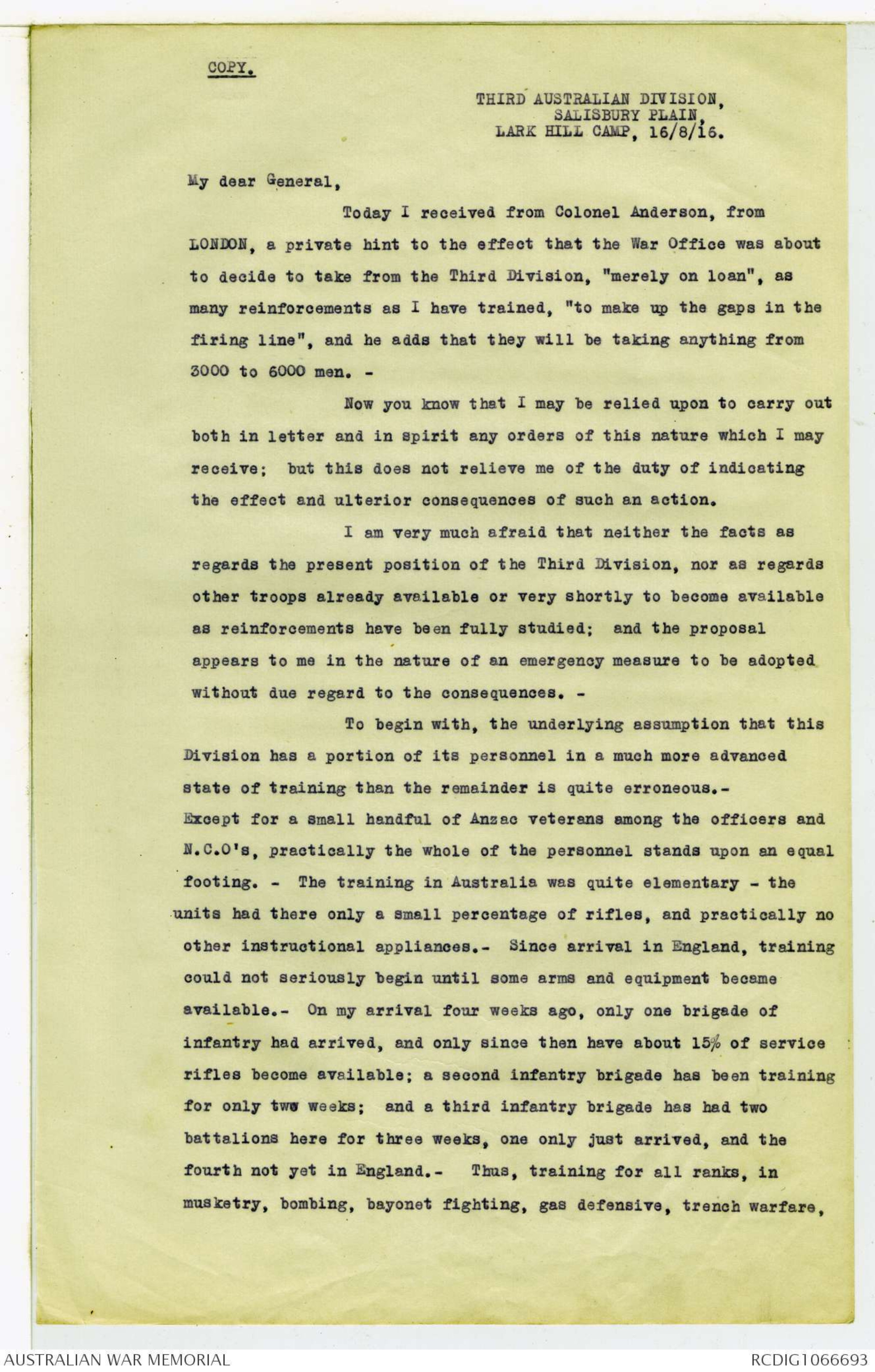
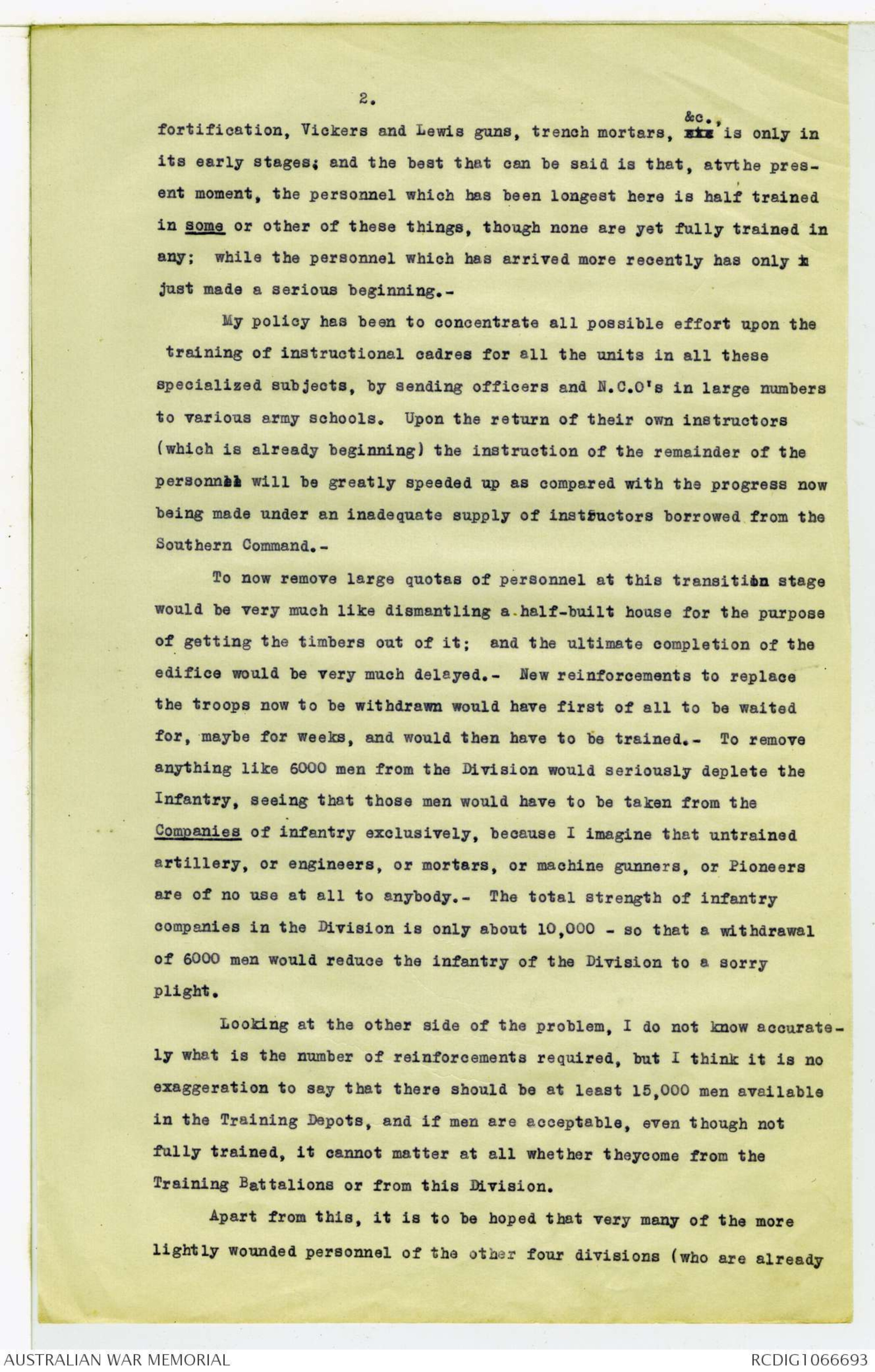
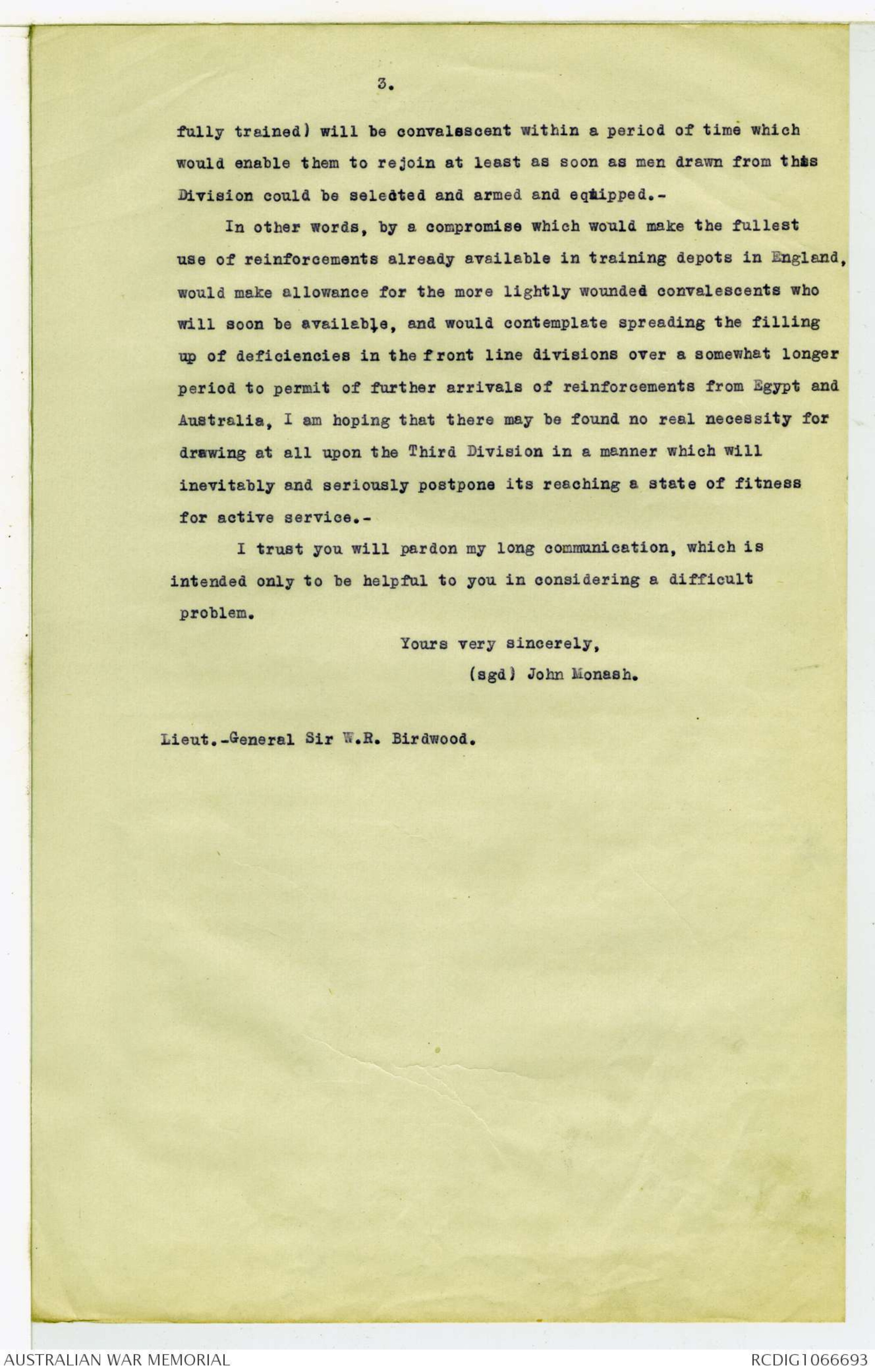
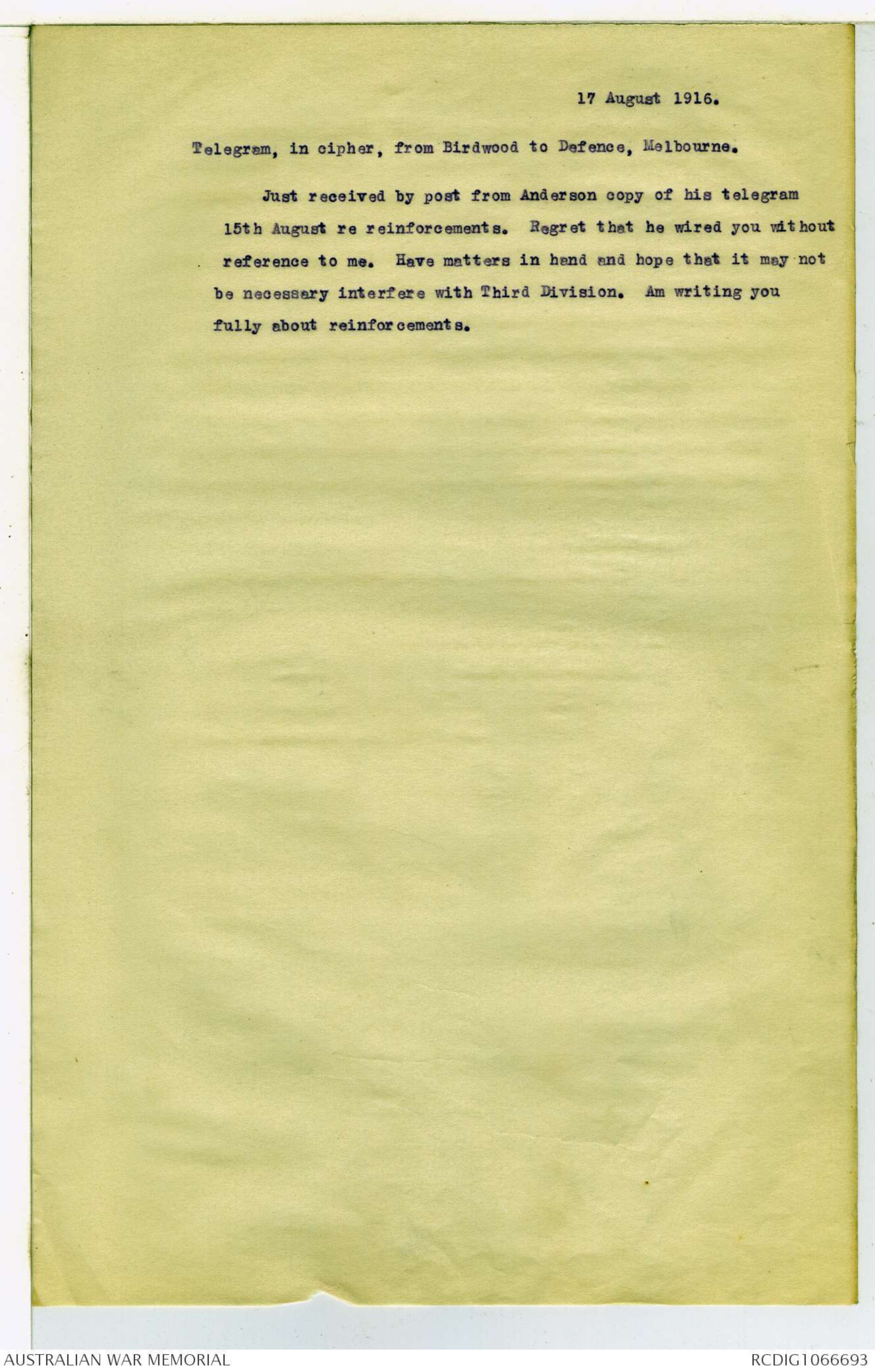
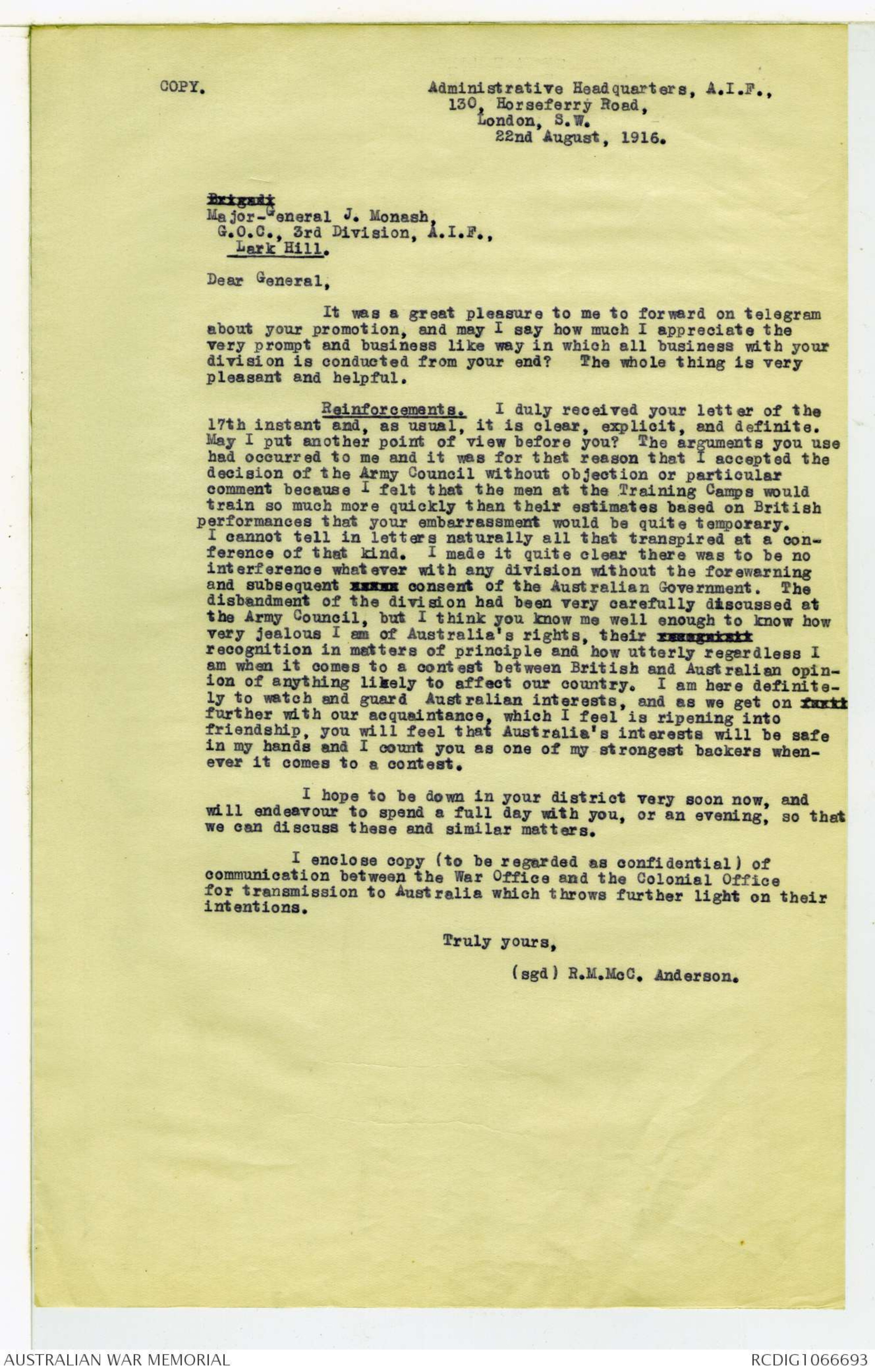
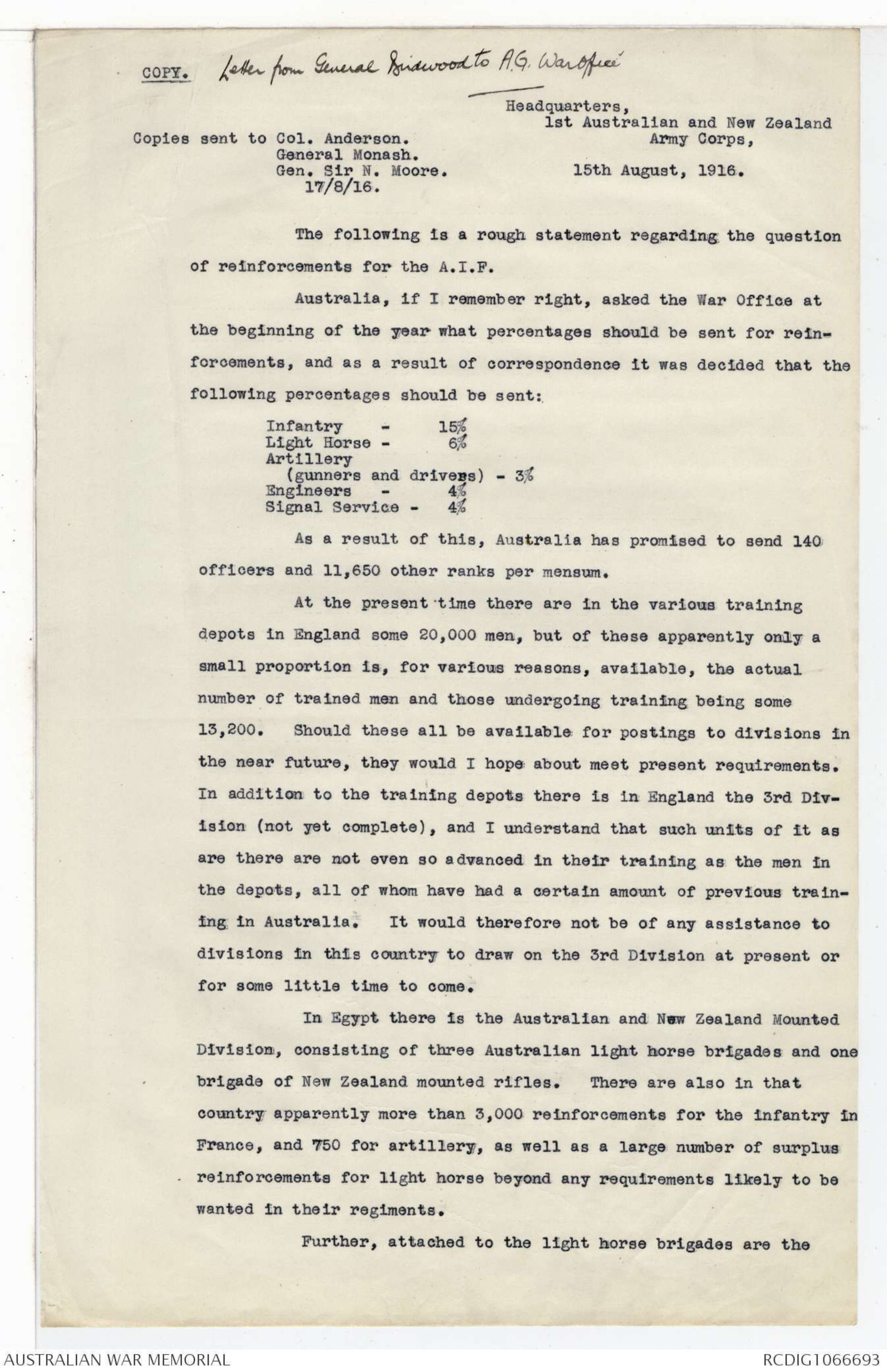
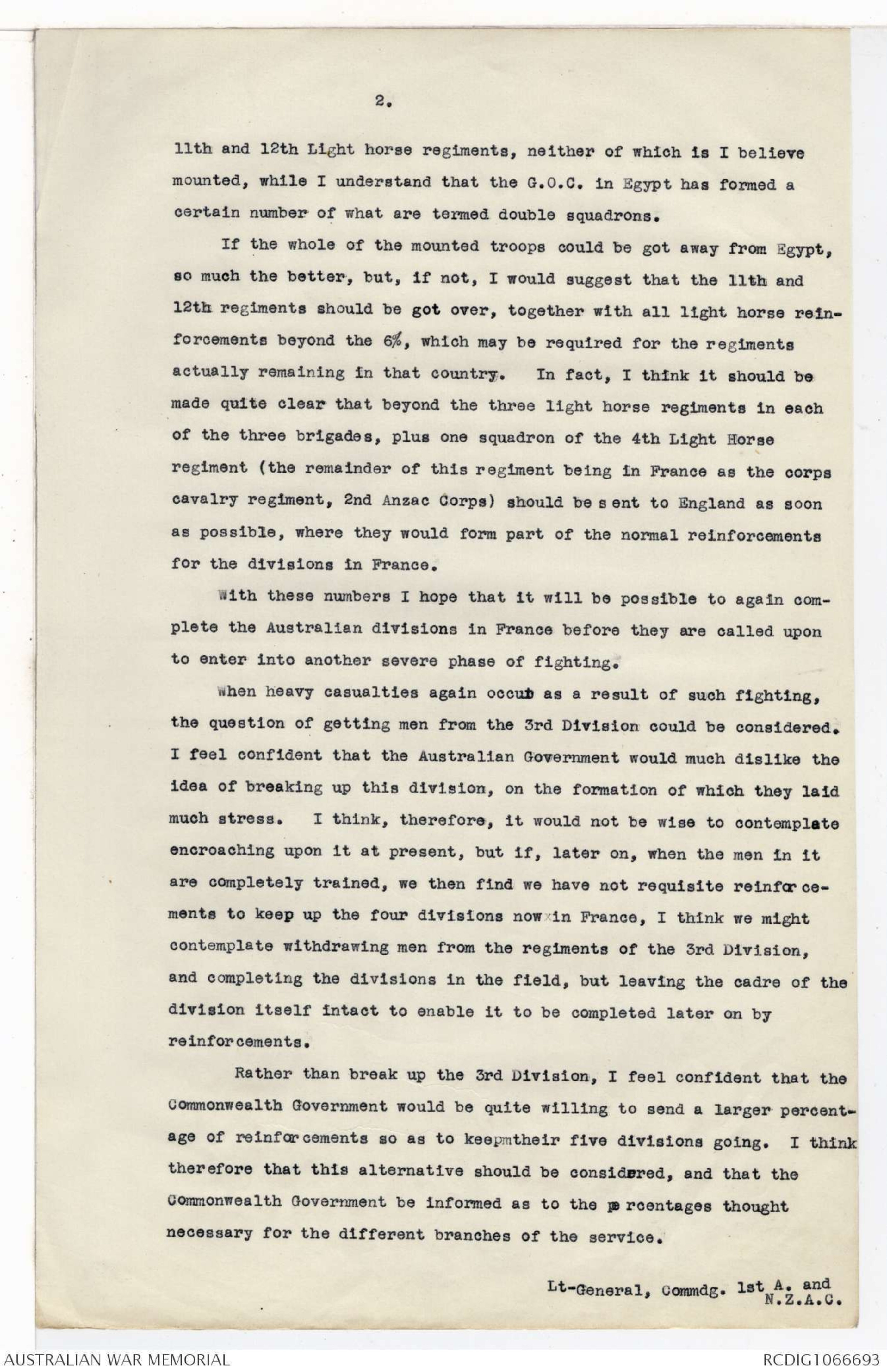
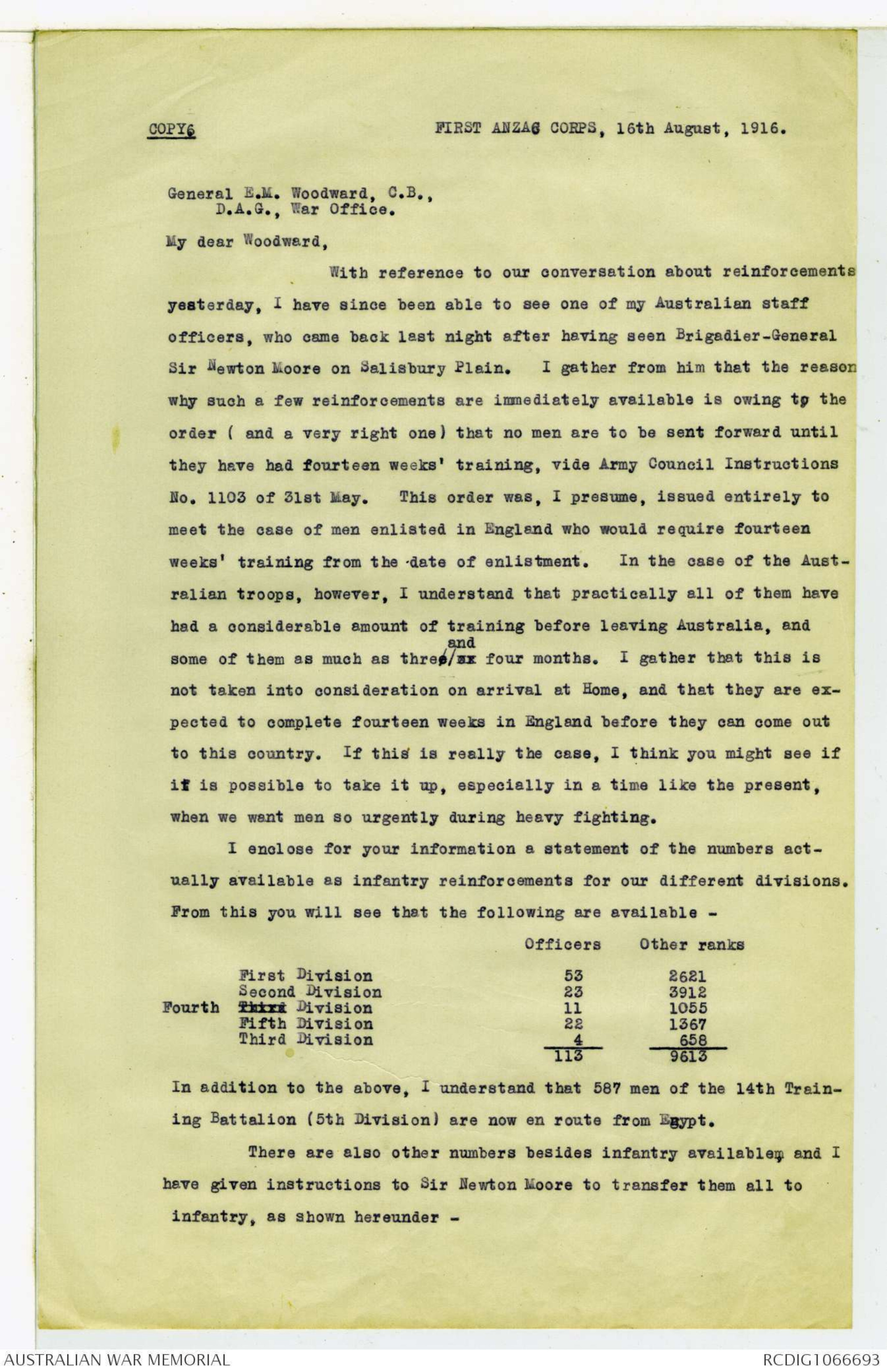
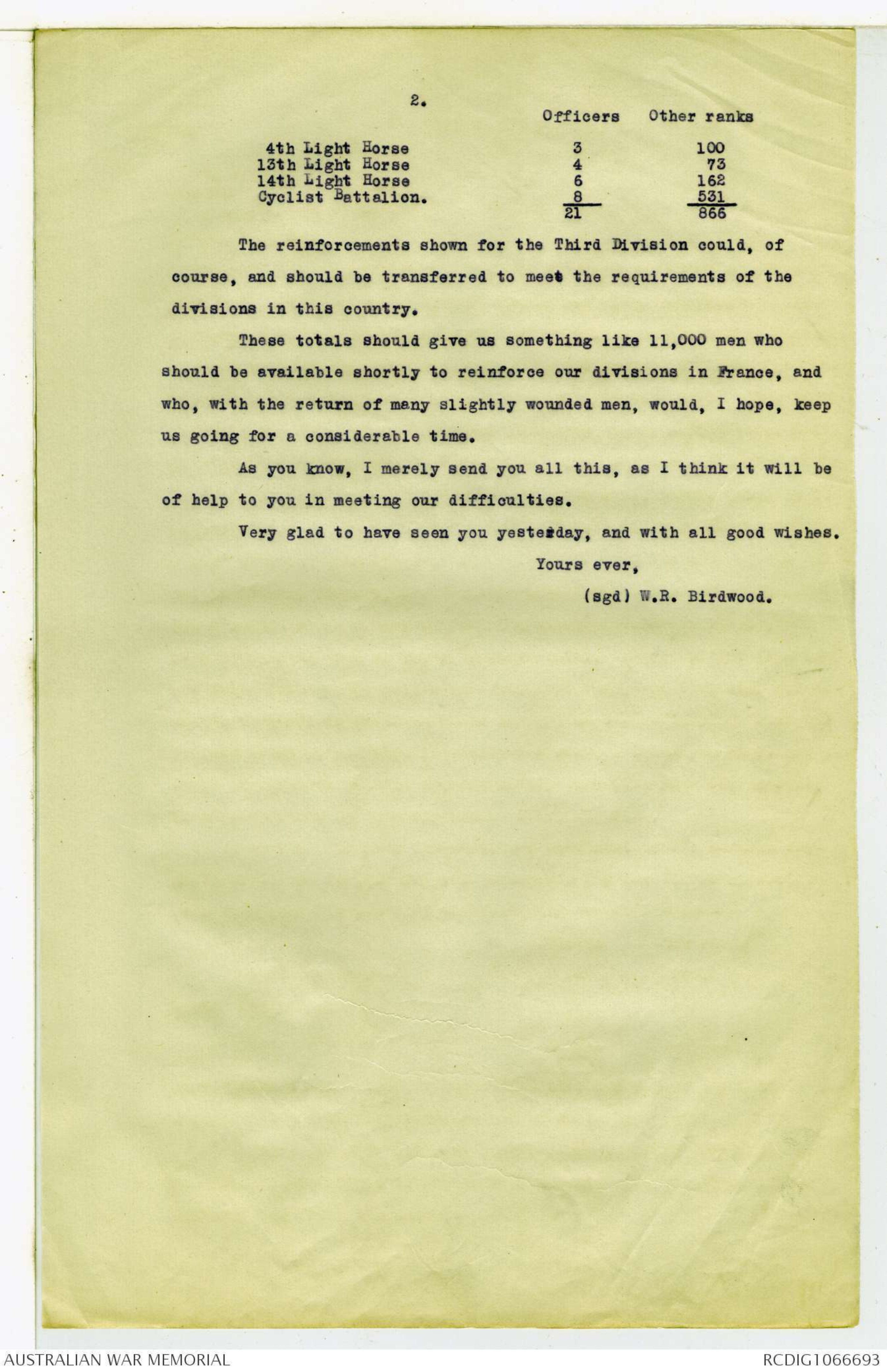
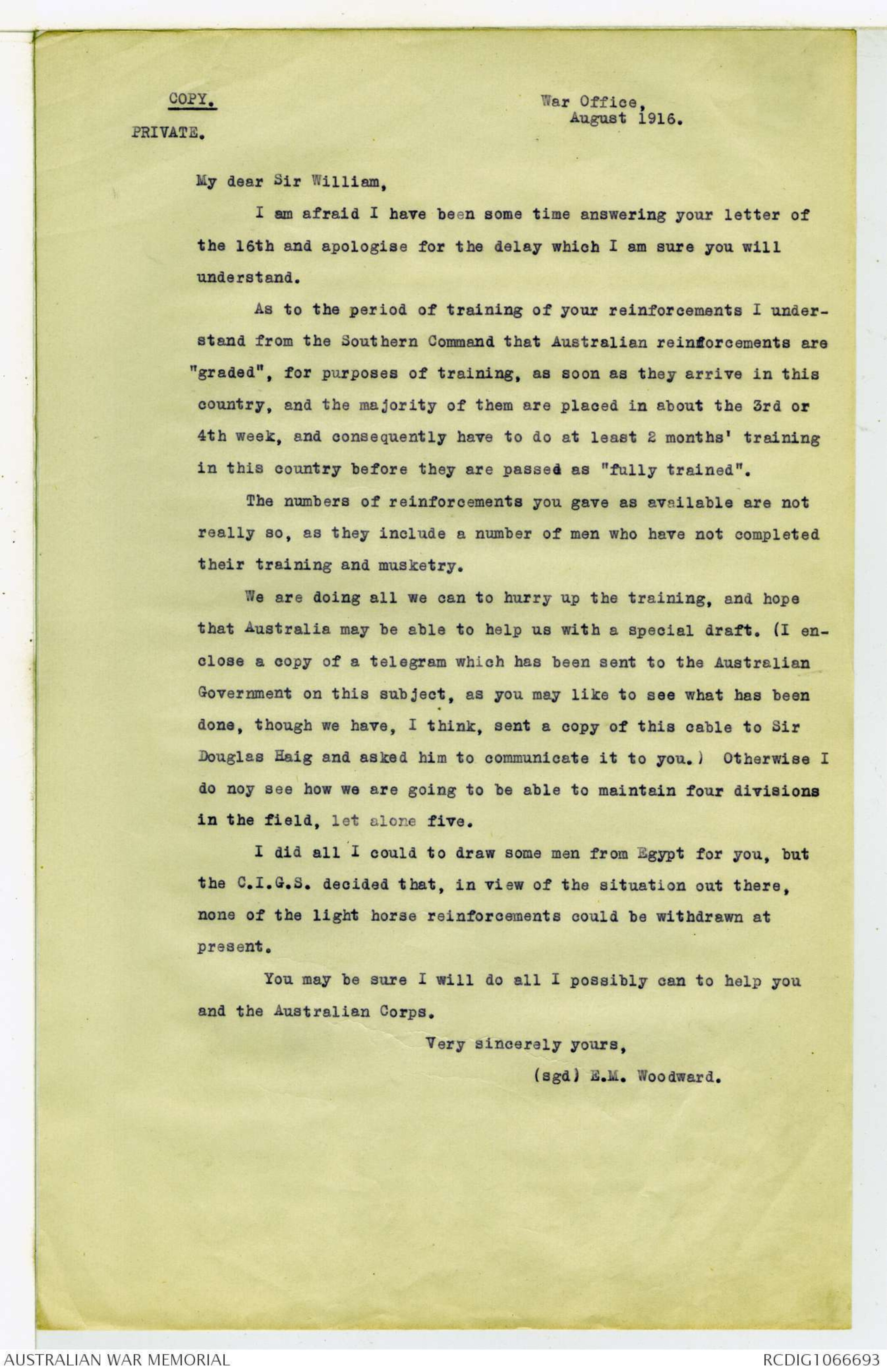
COPY.
THIRD AUSTRALIAN DIVISION,
SALISBURY PLAIN
LARK HILL CAMP, 16/8/i6.
My dear General,
Today I received from Colonel Anderson, from
LONDON, a private hint to the effect that the War Office was about
to decide to take from the Third Division, "merely on loan", as
many reinforcements as I have trained, "to make up the gaps in the
firing line", and he adds that they will be taking anything from
3000 to 6000 men. -
Now you know that I may be relied upon to carry out
both in letter and in spirit any orders of this nature which I may
receive; but this does not relieve me of the duty of indicating
the effect and ulterior consequences of such an action.
I am very much afraid that neither the facts as
regards the present position of the Third Division, nor as regards
other troops already available or very shortly to become available
as reinforcements have been fully studied; and the proposal
appears to me in the nature of an emergency measure to be adopted
without due regard to the consequences. -
To begin with, the underlying assumption that this
Division has a portion of its personnel in a much more advanced
state of training than the remainder is quite erroneous.-
Except for a small handful of Anzac veterans among the officers and
N.C.O's, practically the whole of the personnel stands upon an equal
footing. - The training in Australia was quite elementary - the
units had there only a small percentage of rifles, and practically no
other instructional appliances.- Since arrival in England, training
could not seriously begin until some arms and equipment became
available.- On my arrival four weeks ago, only one brigade of
infantry had arrived, and only since then have about 15% of service
rifles become available; a second infantry brigade has been training
for only two weeks; and a third infantry brigade has had two
battalions here for three weeks, one only just arrived, and the
fourth not yet in England.- Thus, training for all ranks, in
musketry, bombing, bayonet fighting, gas defensive, trench warfare,
Sc.
fortification, Vickers and Lewis guns, trench mortars, xxx &c is only in
its early stages; and the best that can be said is that, atvthe present
moment, the personnel which has been longest here is half trained
in some or other of these things, though none are yet fully trained in
any: while the personnel which has arrived more recently has only xc
just made a serious beginning.-
My policy has been to concentrate all possible effort upon the
training of instructional cadres for all the units in all these
specialized subjects, by sending officers and N.C.O's in large numbers
to various army schools. Upon the return of their own instructors
(which is already beginning) the instruction of the remainder of the
personn will be greatly speeded up as compared with the progress now
being made under an inadequate supply of instructors borrowed from the
Southern Command.-
To now remove large quotas of personnel at this transition stage
would be very much like dismantling a. half-built house for the purpose
of getting the timbers out of it; and the ultimate completion of the
edifice would be very much delayed.- New reinforcements to replace
the troops now to be withdrawn would have first of all to be waited
for, maybe for weeks, and would then have to be trained.- To remove
anything like 6000 men from the Division would seriously deplete the
Infantry, seeing that those men would have to be taken from the
Companies of infantry exclusively, because I imagine that untrained
artillery, or engineers, or mortars, or machine gunners, or Pioneers
are of no use at all to anybody.- The total strength of infantry
companies in the Division is only about 10,000 - so that a withdrawal
of 6000 men would reduce the infantry of the Division to a sorry
plight.
Looking at the other side of the problem, I do not know accurately
what is the number of reinforcements required, but I think it is no
exaggeration to say that there should be at least 15,000 men available
in the Training Depots, and if men are acceptable, even though not
fully trained, it cannot matter at all whether theycome from the
Training Battalions or from this Division.
Apart from this, it is to be hoped that very many of the more
lightly wounded personnel of the other four divisions (who are already
fully trained) will be convalescent within a period of time which
would enable them to rejoin at least as soon as men drawn from this
Division could be selected and armed and equipped.-
In other words, by a compromise which would make the fullest
use of reinforcements already available in training depots in England
would make allowance for the more lightly wounded convalescents who
will soon be available, and would contemplate spreading the filling
up of deficiencies in the front line divisions over a somewhat longer
period to permit of further arrivals of reinforcements from Egypt and
Australia, I am hoping that there may be found no real necessity for
drawing at all upon the Third Division in a manner which will
inevitably and seriously postpone its reaching a state of fitness
for active service.-
I trust you will pardon my long communication, which is
intended only to be helpful to you in considering a difficult
problem.
Yours very sincerely,
(sgd) John Monash.
Lieut.-General Sir W.R. Birdwood.
17 August 1916.
Telegram, in cipher, from Birdwood to Defence, Melbourne.
Just received by post from Anderson copy of his telegram
15th August re reinforcements. Regret that he wired you without
reference to me. Have matters in hand and hope that it may not
be necessary interfere with Third Division. Am writing you
fully about reinforcements.
COPY.
Administrative Headquarters, A.I.F.,
130 Horseferry Road,
London, S.W.
22nd August, 1916.xxxxx
Major-General J. Monasl
G.O.C., 3rd Division, A.I.F.,
Lark Hill.
Dear General,
It was a great pleasure to me to forward on telegram
about your promotion, and may I say how much I appreciate the
very prompt and business like way in which all business with your
division is conducted from your end? The whole thing is very
pleasant and helpful.
Reinforcements.
I duly received your letter of the
17th instant and, as usual, it is clear, explicit, and definite.
May I put another point of view before you? The arguments you use
had occurred to me and it was for that reason that I accepted the
decision of the Army Council without objection or particular
comment because 1 felt that the men at the Training Camps would
train so much more quickly than their estimates based on British
performances that your embarrassment would be quite temporary.
I cannot tell in letters naturally all that transpired at a conference
of that kind. I made it quite clear there was to be no
interference whatever with any division without the forewarning
and subsequent xxxxxxx consent of the Australian Government. The
disbandment of the division had been very carefully discussed at
the Army Council, but I think you know me well enough to know how
very jealous I am of Australia's rights, their xxxxxxxx
recognition in matters of principle and how utterly regardless I
am when it comes to a contest between British and Australian
opinion of anything likely to affect our country. I am here
definitely to watch and guard Australian interests, and as we get on xxxx
further with our acquaintance, which I feel is ripening into
friendship, you will feel that Australia's interests will be safe
in my hands and I count you as one of my strongest backers
whenever it comes to a contest.
I hope to be down in your district very soon now, and
will endeavour to spend a full day with you, or an evening, so that
we can discuss these and similar matters.
I enclose copy (to be regarded as confidential) of
communication between the War Office and the Colonial Office
for transmission to Australia which throws further light on their
intentions.
Truly yours,
(sgd) R.M.McC. Anderson.
Letter from General Birdwood to A.G. war office.
COPY.
Headquarters,
1st Australian and New Zealand
Army Corps,
15th August, 1916.
Copies sent to Col. Anderson.
General Monash.
Gen. Sir N. Moore.
17/8/16.
The following is a rough statement regarding the question
of reinforcements for the A.I.F.
Australia, if I remember right, asked the War Office at
the beginning of the year what percentages should be sent for
reinforcements, and as a result of correspondence it was decided that the
following percentages should be sent:
Infantry- 15%
Light Horse -6%
Artillery
(gunners and drivers) - 3%
Engineers-4%
Signal Service - 4%
As a result of this, Australia has promised to send 140
officers and 11,650 other ranks per mensum.
At the present time there are in the various training
depots in England some 20,000 men, but of these apparently only a
small proportion is, for various reasons, available, the actual
number of trained men and those undergoing training being some
13,200. Should these all be available for postings to divisions in
the near future, they would I hope about meet present requirements.
In addition to the training depots there is in England the 3rd
Division (not yet complete), and I understand that such units of it as
are there are not even so advanced in their training as the men in
the depots, all of whom have had a certain amount of previous
training in Australia. It would there fore not be of any assistance to
divisions in this country to draw on the 3rd Division at present or
for some little time to come.
In Egypt there is the Australian and New Zealand Mounted
Division, consisting of three Australian light horse brigades and one
brigade of New Zealand mounted rifles. There are also in that
country apparently more than 3,000 reinforcements for the infantry in
France, and 750 for artillery, as well as a large number of surplus
reinforcements for light horse beyond any requirements likely to be
wanted in their regiments.
Further, attached to the light horse brigades are the
2.
11th and 12th Light horse regiments, neither of which is I believe
mounted, while I understand that the G.O.C. in Egypt has formed a
certain number of what are termed double squadrons.
If the whole of the mounted troops could be got away from Egypt,
so much the better, but, if not, I would suggest that the 11th and
12th regiments should be got over, together with all light horse
reinforcements beyond the 6%, which may be required for the regiments
actually remaining in that country. In fact, I think it should be
made quite clear that beyond the three light horse regiments in each
of the three brigades, plus one squadron of the 4th Light Horse
regiment (the remainder of this regiment being in France as the corps
cavalry regiment, 2nd Anzac Corps) should be sent to England as soon
as possible, where they would form part of the normal reinforcements
for the divisions in France.
With these numbers I hope that it will be possible to again complete
the Australian divisions in France before they are called upon
to enter into another severe phase of fighting.
When heavy casualties again occur as a result of such fighting,
the question of getting men from the 3rd Division could be considered.
I feel confident that the Australian Government would much dislike the
idea of breaking up this division, on the formation of which they laid
much stress. I think, therefore, it would not be wise to contemplate
encroaching upon it at present, but if, later on, when the men in it
are completely trained, we then find we have not requisite reinforcements
to keep up the four divisions nowxin France, I think we might
contemplate withdrawing men from the regiments of the 3rd Division,
and completing the divisions in the field, but leaving the cadre of the
division itself intact to enable it to be completed later on by
reinforcements.
Rather than break up the 3rd Division, I feel confident that the
Commonwealth Government would be quite willing to send a larger percent.
age of reinforcements so as to keepmtheir five divisions going. I think
therefore that this alternative should be considered, and that the
Commonwealth Government be informed as to the percentages thought
necessary for the different branches of the service.
Lt-General, Commdg. 1st A. and
N.Z.A.C.
FIRST ANZAC CORPS, l6th August, 1916.
COPY
General E.M. Woodward, C.B.,
D.A.G., War Office.
My dear Woodward,
With reference to our conversation about reinforcements
yesterday, I have since been able to see one of my Australian staff
officers, who came back last night after having seen Brigadier-General
Sir Newton Moore on Salisbury Plain. I gather from him that the reason
why such a few reinforcements are immediately available is owing ty the
order (and a very right one) that no men are to be sent forward until
they have had fourteen weeks' training, vide Army Council Instructions
No. 1103 of 31st May. This order was, I presume, issued entirely to
meet the case of men enlisted in England who would require fourteen
weeks' training from the date of enlistment. In the case of the Australian
troops, however, I understand that practically all of them have
had a considerable amount of training before leaving Australia, and
some of them as much as three ^and four months. I gather that this is
not taken into consideration on arrival at Home, and that they are
expected to complete fourteen weeks in England before they can come out
to this country. If this is really the case, I think you might see if
if is possible to take it up, especially in a time like the present,
when we want men so urgently during heavy fighting.
I enclose for your information a statement of the numbers
actually available as infantry reinforcements for our different divisions.
From this you will see that the following are available -
| Officers | Other ranks | |
| First Division | 53 | 2621 |
| Second Division | 23 | 3912 |
| 11 | 1055 | |
| Fifth Division | 22 | 1367 |
| Third Division | 3 | 658 |
| 113 | 9613 |
In addition to the above, I understand that 587 men of the l4th
Training Battalion (5th Division) are now en route from Egypt.
There are also other numbers besides infantry availablem and I
have given instructions to Sir Newton Moore to transfer them all to
infantry, as shown hereunder -
2.
| Officers | Other ranks | |
| 4th Light Horse | 3 | 100 |
| 13th Light Horse | 4 | 73 |
| 14th Light Horse | 6 | 162 |
| Cyclist Battalion | 8 | 531 |
| 21 | 866 |
The reinforcements shown for the Third Division could, of
course, and should be transferred to meet the requirements of the
divisions in this country.
These totals should give us something like 11,000 men who
should be available shortly to reinforce our divisions in France, and
who, with the return of many slightly wounded men, would, I hope, keep
us going for a considerable time.
As you know, I merely send you all this, as I think it will be
of help to you in meeting our difficulties.
Very glad to have seen you yesterday, and with all good wishes.
Yours ever,
(sgd) W.R. Birdwood.
COPY.
War Office
August 1916.
PRIVATE.
My dear Sir William,
I am afraid I have been some time answering your letter of
the l6th and apologise for the delay which I am sure you will
understand.
As to the period of training of your reinforcements I understand
from the Southern Command that Australian reinforcements are
"graded", for purposes of training, as soon as they arrive in this
country, and the majority of them are placed in about the 3rd or
4th week, and consequently have to do at least 2 months' training
in this country before they are passed as "fully trained".
The numbers of reinforcements you gave as available are not
really so, as they include a number of men who have not completed
their training and musketry.
We are doing all we can to hurry up the training, and hope
that Australia may be able to help us with a special draft. (I enclose
a copy of a telegram which has been sent to the Australian
Government on this subject, as you may like to see what has been
done, though we have, I think, sent a copy of this cable to Sir
Douglas Haig and asked him to communicate it to you.) Otherwise I
do not see how we are going to be able to maintain four divisions
in the field, let alone five.
I did all I could to draw some men from Egypt for you, but
the C.I.G.S. decided that, in view of the situation out there,
none of the light horse reinforcements could be withdrawn at
present.
You may be sure I will do all I possibly can to help you
and the Australian Corps.
Very sincerely yours,
(sgd) E.M. Woodward.
 Sam scott
Sam scottThis transcription item is now locked to you for editing. To release the lock either Save your changes or Cancel.
This lock will be automatically released after 60 minutes of inactivity.